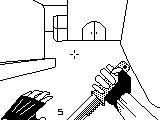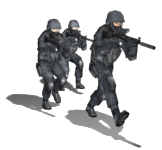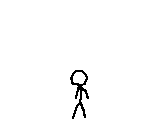0
Narrative Text
Narrative text is story, mostly, narrative are imaginary stories but sometimes narratives can be factual too. Narrative text is to tell something in the past. Narrative includes fairy stories, fables, mystery, science, fictions any romance and horror.
Narrative have three elements, there are:
• Orientation is sets the scene and the participant
• Complication is crisis arias
• Resolution is include the crisis resolved for the better or worse.
Likes Recount text, Narrative text using verb II, too.
Characteristic of Narrative Text :
♥ Entertain the reader
♥ Structure of the text :
> Orientation
> Complication
> Resolution
♥ Other generic structure :
> Evaluation and coda
♥ Language features :
> Nouns, adjective, time conjuction and conjuctions, adverb and adverbial phrases, action
verbs, saying verbs.
Kind of Narrative Text :
♥ Myth
♥ Legend
♥ Fable
♥ Folklore
Example Narrative Text :
Now, the crocodile was very hungry, so when it was in the middle of the river, it stopped and said to the monkey, ”Monkey, my father is very sick. He must eat the heart of the monkey. Then he will be strong again.”
The monkey thought for a while. Then he told the crocodile to swim back to the river bank.
“What’s for?” asked the crocodile.
“Because I didn’t bring my heart with me,” said the monkey. “I left it under the tree, near some coconuts.”
So, the crocodile turned around and swam back to the bank of the river. As soon as they reached the river bank, the monkey jumped off the crocodile’s back and climbed up to the top of a tree.
“Where is your heart?” asked the crocodile.
“You are foolish,” the monkey said to the crocodile. “Now I am free and you have nothing.”
The monkey told the crocodile not to try to fool him again. The crocodile swam away, hungry.
Narrative have three elements, there are:
• Orientation is sets the scene and the participant
• Complication is crisis arias
• Resolution is include the crisis resolved for the better or worse.
Likes Recount text, Narrative text using verb II, too.
Characteristic of Narrative Text :
♥ Entertain the reader
♥ Structure of the text :
> Orientation
> Complication
> Resolution
♥ Other generic structure :
> Evaluation and coda
♥ Language features :
> Nouns, adjective, time conjuction and conjuctions, adverb and adverbial phrases, action
verbs, saying verbs.
Kind of Narrative Text :
♥ Myth
♥ Legend
♥ Fable
♥ Folklore
Example Narrative Text :
"Monkey and Crocodile"
One day a monkey wanted to cross a river. He saw a crocodile in the river, so he asked the crocodile to take him across the other side. The crocodile told the monkey to jump on its back. Then the crocodile swam down the river. Now, the crocodile was very hungry, so when it was in the middle of the river, it stopped and said to the monkey, ”Monkey, my father is very sick. He must eat the heart of the monkey. Then he will be strong again.”
The monkey thought for a while. Then he told the crocodile to swim back to the river bank.
“What’s for?” asked the crocodile.
“Because I didn’t bring my heart with me,” said the monkey. “I left it under the tree, near some coconuts.”
So, the crocodile turned around and swam back to the bank of the river. As soon as they reached the river bank, the monkey jumped off the crocodile’s back and climbed up to the top of a tree.
“Where is your heart?” asked the crocodile.
“You are foolish,” the monkey said to the crocodile. “Now I am free and you have nothing.”
The monkey told the crocodile not to try to fool him again. The crocodile swam away, hungry.
0
Gratitude, Compliment, and Congratulation is a form of expression and feelings of pleasure to the assistance provided sayings, exprssion compliment with someone, and expression of pleased with the success of others.
Gratitude is an expression that we show or say to express grateful feeling to other people. When speaking English, you say “thanks” very often. Please say “thank you” when people give you something, help you do something, wish you something and give you a compliment etc.
GRATITUDE, COMPLIMENT, & CONGRATULATION
Gratitude is an expression that we show or say to express grateful feeling to other people. When speaking English, you say “thanks” very often. Please say “thank you” when people give you something, help you do something, wish you something and give you a compliment etc.
0
SIMPLE FUTURE
Simple Future Tense used to express occurrence/activity to happened/to be done in the future,do 10 minutes or 1 hour to come ,tomorrow ,the day after tomorrow ,next week,next month ,next year,and so on.If past tenses express occurrence/activity after now ( time past ) ,tenses future simple express occurrence /activity before now.
( time future).
Positive Tenses
Pattern :
* S + will+ verb1+ O+ modifier
* S + ( is,are.am ) + going + verb1+ O+ modifier
* S + ( is,are,am ) + ( verb1 + ing ) + O + modifier
Example for positive tenses... let us look again: :
* Farmers in Jati Bali will grow rice crops next month
* Some students are going to conduct research on vegetative plant propagations next semester.
* Transpiration will start to increase tomorrow morning.
Negative Tense
Pattern :
* S + will + not + verb1+ O + modifier
* S +{ ( is,are,am ) going to }+ not +verb1 + O + modifier
* S + ( is,are,am ) + ( verb1 + ing ) + O + modifier
Example for negative tenses... let us look again: : :
* Farmers in Jati Bali will not grow rice crops next month
* Transpiration will not start to increase tonight
* He will not be very happy when he finds out.
Question
Pattern :
* Will + S + verb1+ O + modifier
* Will + S + { ( is,are,am ) going to }+ O + modifier
* Will + S + ( is,are,am ) + ( verb1 + ing ) + O + modifier
Example for question tenses... let us look again: : :
+ Will farmers in Jati in Bali grow rice crops next month ?
+ Will transpiration start to increase tomorrow morning ?
+ Will he be very happy when he finds out ?
( time future).
Positive Tenses
Pattern :
* S + will+ verb1+ O+ modifier
* S + ( is,are.am ) + going + verb1+ O+ modifier
* S + ( is,are,am ) + ( verb1 + ing ) + O + modifier
Example for positive tenses... let us look again: :
* Farmers in Jati Bali will grow rice crops next month
* Some students are going to conduct research on vegetative plant propagations next semester.
* Transpiration will start to increase tomorrow morning.
Negative Tense
Pattern :
* S + will + not + verb1+ O + modifier
* S +{ ( is,are,am ) going to }+ not +verb1 + O + modifier
* S + ( is,are,am ) + ( verb1 + ing ) + O + modifier
Example for negative tenses... let us look again: : :
* Farmers in Jati Bali will not grow rice crops next month
* Transpiration will not start to increase tonight
* He will not be very happy when he finds out.
Question
Pattern :
* Will + S + verb1+ O + modifier
* Will + S + { ( is,are,am ) going to }+ O + modifier
* Will + S + ( is,are,am ) + ( verb1 + ing ) + O + modifier
Example for question tenses... let us look again: : :
+ Will farmers in Jati in Bali grow rice crops next month ?
+ Will transpiration start to increase tomorrow morning ?
+ Will he be very happy when he finds out ?
0
>,< to offer suggestions or possibility . Example:
Rio : Oh, no! I left my shorts.
William : Don’t worry, Rio. You could borrow my shorts.
Dimas : I’m having trouble with English.
Mazhar : Why don’t you ask Agnes? Perhaps she could help you.
>,< to indicate that the ability existed in the past but doesn’t exist now. Example:
Siska : Dhe, can you climb the durian tree?
Dhea : Well… I could climb durian tree when I was so young. But I think I’m too heavy to climb it.
Rika : Grandpa, what could you do when you were younger?
Grandpa : When I was younger, I could swim across the big river very well and faster.
>,< to express polite requests. Example:
* Could I borrow your book, please ?
* Could you lend me your cloth now ?
* Could you please close the window ?
* Could you pass the sugar ?
2. Would + Verb base
>,< for an action that was repeated regularly in the past. Example:
* When I was a child, I would visit my grandparents every weekend.
* On Sundays, when I was a child, we would all get up early and go fishing.
>,< insert rather into the pattern and use this expression to express preferences. Example:
Nalendro : What would you rather do in the weekend, go to the party or stay home?
Tommy : I would rather go to the party than stay home.
Riana : Which country would you rather visit?
Thesa : I would rather visit Italia than Somalia.
>,< to express polite requests. Example:
Arief : Would you mind cycling with me, Agra ?
Agra : No, not at all. It would be nice.
Trithalia : Would you please pass the helmet, Novina ?
Novina : No problem.
3. Should + Verb base
>,< to give definite advice (advisability). Example:
Nadya : Lina, you should study tonight. You will have English test tomorrow, won’t you?
Lina : I will, Nadya.
Ollyf : You should paint your door, Dimas. It looks terrible.
Dimas : Yes, I know I should.
>,< to express the subject’s obligation or duty: Example:
* You should practice for more than an hour. (to musical friend)
* They shouldn’t allow parking here; the street is too narrow.
* Application should be sent before March 25th.
4. Might + Verb base
>,< to tell possibilities. Example:
Thea : Where is Aulia ?
Yanty : He might be in the studio with Ollyf.
>,< To express polite requests
Example:
Deffi : Might I borrow your coat?
Dwi : I’m afraid not. It has been brought by Donny for weeks and I don’t know when he’ll return it.
So,,
When do we use modals ?
* To talk about someone's ability (or inability) to do something
example:
"We can find your house without the street plan."
"She can't have a daughter that old!"
* To talk about an action that is necessary (or impossible, or not necessary)
example:
"You must always have your driver's licence when you are driving your car."
"You needn't carry your passport around with you."
* To talk about a situation that is possible (or impossible)
example:
"Do be careful with that glass, the baby might knock it over"
MODALS IN THE PAST FORM
Present Form = Past Form
Can = Could
May = Might
Will = Would
Shall = Should
Must = -
Must = -
Ought to = -
Need = -
1. Could + Verb base>,< to offer suggestions or possibility . Example:
Rio : Oh, no! I left my shorts.
William : Don’t worry, Rio. You could borrow my shorts.
Dimas : I’m having trouble with English.
Mazhar : Why don’t you ask Agnes? Perhaps she could help you.
>,< to indicate that the ability existed in the past but doesn’t exist now. Example:
Siska : Dhe, can you climb the durian tree?
Dhea : Well… I could climb durian tree when I was so young. But I think I’m too heavy to climb it.
Rika : Grandpa, what could you do when you were younger?
Grandpa : When I was younger, I could swim across the big river very well and faster.
>,< to express polite requests. Example:
* Could I borrow your book, please ?
* Could you lend me your cloth now ?
* Could you please close the window ?
* Could you pass the sugar ?
2. Would + Verb base
>,< for an action that was repeated regularly in the past. Example:
* When I was a child, I would visit my grandparents every weekend.
* On Sundays, when I was a child, we would all get up early and go fishing.
>,< insert rather into the pattern and use this expression to express preferences. Example:
Nalendro : What would you rather do in the weekend, go to the party or stay home?
Tommy : I would rather go to the party than stay home.
Riana : Which country would you rather visit?
Thesa : I would rather visit Italia than Somalia.
>,< to express polite requests. Example:
Arief : Would you mind cycling with me, Agra ?
Agra : No, not at all. It would be nice.
Trithalia : Would you please pass the helmet, Novina ?
Novina : No problem.
3. Should + Verb base
>,< to give definite advice (advisability). Example:
Nadya : Lina, you should study tonight. You will have English test tomorrow, won’t you?
Lina : I will, Nadya.
Ollyf : You should paint your door, Dimas. It looks terrible.
Dimas : Yes, I know I should.
>,< to express the subject’s obligation or duty: Example:
* You should practice for more than an hour. (to musical friend)
* They shouldn’t allow parking here; the street is too narrow.
* Application should be sent before March 25th.
4. Might + Verb base
>,< to tell possibilities. Example:
Thea : Where is Aulia ?
Yanty : He might be in the studio with Ollyf.
>,< To express polite requests
Example:
Deffi : Might I borrow your coat?
Dwi : I’m afraid not. It has been brought by Donny for weeks and I don’t know when he’ll return it.
So,,
When do we use modals ?
* To talk about someone's ability (or inability) to do something
example:
"We can find your house without the street plan."
"She can't have a daughter that old!"
* To talk about an action that is necessary (or impossible, or not necessary)
example:
"You must always have your driver's licence when you are driving your car."
"You needn't carry your passport around with you."
* To talk about a situation that is possible (or impossible)
example:
"Do be careful with that glass, the baby might knock it over"
0
OFFERING
Anyone know the word "Offering"..?? If I am.. know a little ,, therefore,, I'm so curious.. Let's find out..!!
The expression of “ Would you like….” is normally used for offering something to someone.
Antonio : Would you like a fried rice Fit ?
Nalendro : Yes, please. Thank you. Hmmm…that is my favourite food.
Antonio : Thank you. I’m glad you like it.
Ways to say it
* Would you like a cup of coffee, Daniel ?
* Should I get you a bottle of water ?
* Could I offer you a glass of milk, Mr. Patrick ?
* Would you care some salad ?
Ofering to friends:
* Want some?
* Have some?
* Chocolate?
* Grab some for yourself ?
Less formal expressions:
* Would you like to have a pancake?
* Why don’t you have some lemonade?
* What can I get for you?
* What will you have?
Declining an offering
* No, thanks
* No, really won’t, thanks
* Not for me, thanks.
Accepting an offering:
* Thank you.
* Yes, please
* I’d like it very much
* That would be very nice
The expression of “ Would you like….” is normally used for offering something to someone.
Antonio : Would you like a fried rice Fit ?
Nalendro : Yes, please. Thank you. Hmmm…that is my favourite food.
Antonio : Thank you. I’m glad you like it.
Ways to say it
* Would you like a cup of coffee, Daniel ?
* Should I get you a bottle of water ?
* Could I offer you a glass of milk, Mr. Patrick ?
* Would you care some salad ?
Ofering to friends:
* Want some?
* Have some?
* Chocolate?
* Grab some for yourself ?
Less formal expressions:
* Would you like to have a pancake?
* Why don’t you have some lemonade?
* What can I get for you?
* What will you have?
Declining an offering
* No, thanks
* No, really won’t, thanks
* Not for me, thanks.
Accepting an offering:
* Thank you.
* Yes, please
* I’d like it very much
* That would be very nice
0
- To err is human or It is human to err.
- To become a well known writer was his life-long ambition or It was his lifelong ambition to become a well known writer.
- To invest all your money in shares is foolish or It is foolish to invest all your money in shares.
__When the real subject is a phrase that includes a gerund, it is used as a provisional subject to begin the sentence. So instead of saying ‘Your trying to fool us is no good’, we say, ‘It is no good your trying to fool us.’__
Note :: that it is possible to change the gerund into an infinitive. Example :
- It won’t be any good for me to complain to the manager.
- It is silly (for you) to throw away this opportunity.
- Will it be any good for me to talk to him about it?
__When the subject is a clause, the sentence usually begins with it. So instead of saying ‘That he was once a communist is true’, we say, ‘It is true that he was once a communist’.__
__Introductory it with seem, appear and look. Introductory it is also used with seem, appear and look when the subject is an infinitive phrase, a phrase with a gerund in it or a clause.__
- It looked doubtful whether she would come
- It seemed strange that she should behave like that.
- It seems possible that she may quit the job.
- It appeared unwise to offend him.
- It does not seem much good going on with the work.
__Introductory it as an object. It is sometimes used as the object of the verbs think, feel, deem, count, consider etc.__
- Don’t you think it dangerous to drive so carelessly?
- I consider it a privilege to have this opportunity of welcoming you.
- I think it odd that she doesn’t write to me these days.
- I think it a pity that she could not win.
- We think it improper that he should be so dictatorial.
- He made it clear what he wanted.
- I find it difficult to talk to him.
__Introductory it in questions. The introductory it is sometimes used in questions.__
- Who was it that broke the window?
==It is Peter who broke the window.
- Why was it that he stole the bread?
==It was because he was poor that he stole the bread.
- When was it that the manager came?
==It was at 10 am that the manager came.
INTRODUCTORY IT
Structure:
It + verb + subject complement + infinitive phrase (real subject)
It is easy to learn English = To learn English is easy
It is easy to find fault with others = To find fault with others is easy
It is difficult to know his motive = To know his motive is difficult
Note :: that when we wish to emphasize the infinitive phrase, it may be put at the beginning, especially when it is short. Example :- To err is human or It is human to err.
- To become a well known writer was his life-long ambition or It was his lifelong ambition to become a well known writer.
- To invest all your money in shares is foolish or It is foolish to invest all your money in shares.
__When the real subject is a phrase that includes a gerund, it is used as a provisional subject to begin the sentence. So instead of saying ‘Your trying to fool us is no good’, we say, ‘It is no good your trying to fool us.’__
It won’t be any good complaining to the manager = Complaining to the manager won’t be any good.
It is silly throwing away this opportunity = Throwing away this opportunity is silly.
Will it be any good my talking to him about it ? = Will my talking to him about it be any good ?
It is no fun having so many children to look after = Having so many children to look after is no fun.
- It won’t be any good for me to complain to the manager.
- It is silly (for you) to throw away this opportunity.
- Will it be any good for me to talk to him about it?
__When the subject is a clause, the sentence usually begins with it. So instead of saying ‘That he was once a communist is true’, we say, ‘It is true that he was once a communist’.__
It does not matter whether he comes or not = Whether he comes or not does not matter.
It is required that he should pay the fine = That he should pay the fine is required.
It is clear that he overheard our conversation = That he overheard our conversation is clear.
It is clear that you are not interested in this offer = That you are not interested in the offer is clear.
It doesn’t matter whether we buy it now or later = Whether we buy it now or later does not matter.
__Introductory it with seem, appear and look. Introductory it is also used with seem, appear and look when the subject is an infinitive phrase, a phrase with a gerund in it or a clause.__
- It looked doubtful whether she would come
- It seemed strange that she should behave like that.
- It seems possible that she may quit the job.
- It appeared unwise to offend him.
- It does not seem much good going on with the work.
__Introductory it as an object. It is sometimes used as the object of the verbs think, feel, deem, count, consider etc.__
- Don’t you think it dangerous to drive so carelessly?
- I consider it a privilege to have this opportunity of welcoming you.
- I think it odd that she doesn’t write to me these days.
- I think it a pity that she could not win.
- We think it improper that he should be so dictatorial.
- He made it clear what he wanted.
- I find it difficult to talk to him.
__Introductory it in questions. The introductory it is sometimes used in questions.__
- Who was it that broke the window?
==It is Peter who broke the window.
- Why was it that he stole the bread?
==It was because he was poor that he stole the bread.
- When was it that the manager came?
==It was at 10 am that the manager came.
Langganan:
Postingan (Atom)












